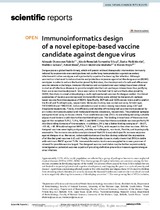| dc.contributor.author | Oluwaseun, Fadaka Adewale | |
| dc.contributor.author | Sibuyi, Nicole Remaliah Samantha | |
| dc.contributor.author | Darius, Riziki | |
| dc.date.accessioned | 2021-10-12T09:22:23Z | |
| dc.date.available | 2021-10-12T09:22:23Z | |
| dc.date.issued | 2021-10 | |
| dc.identifier.citation | A, Oluwaseun. et al . (2021). Immunoinformatics design of a novel epitope-based vaccine candidate against dengue virus. Scientific Reports. 11. 19707. 10.1038/s41598-021-99227-7. | en_US |
| dc.identifier.uri | http://doi.org:10.1038/s41598-021-99227-7. | |
| dc.identifier.uri | http://hdl.handle.net/10566/6894 | |
| dc.description.abstract | Dengue poses a global health threat, which will persist without therapeutic intervention. Immunity induced by exposure to one serotype does not confer long-term protection against secondary infection with other serotypes and is potentially capable of enhancing this infection. Although vaccination is believed to induce durable and protective responses against all the dengue virus (DENV) serotypes in order to reduce the burden posed by this virus, the development of a safe and efficacious vaccine remains a challenge. Immunoinformatics and computational vaccinology have been utilized in studies of infectious diseases to provide insight into the host–pathogen interactions thus justifying their use in vaccine development. Since vaccination is the best bet to reduce the burden posed by DENV, this study is aimed at developing a multi-epitope based vaccines for dengue control. Combined approaches of reverse vaccinology and immunoinformatics were utilized to design multi-epitope based vaccine from the sequence of DENV. Specifically, BCPreds and IEDB servers were used to predict the B-cell and T-cell epitopes, respectively. Molecular docking was carried out using Schrödinger, PATCHDOCK and FIREDOCK. Codon optimization and in silico cloning were done using JCAT and SnapGene respectively. Finally, the efficiency and stability of the designed vaccines were assessed by an in silico immune simulation and molecular dynamic simulation, respectively. The predicted epitopes were prioritized using in-house criteria. Four candidate vaccines (DV-1–4) were designed using suitable adjuvant and linkers in addition to the shortlisted epitopes. The binding interactions of these vaccines against the receptors TLR-2, TLR-4, MHC-1 and MHC-2 | en_US |
| dc.language.iso | en | en_US |
| dc.publisher | Springer | en_US |
| dc.subject | Immuno informatics | en_US |
| dc.subject | Global health | en_US |
| dc.subject | Secondary infection | en_US |
| dc.subject | T cells | en_US |
| dc.title | Immunoinformatics design of a novel epitope-based vaccine candidate against dengue virus | en_US |
| dc.type | Article | en_US |

